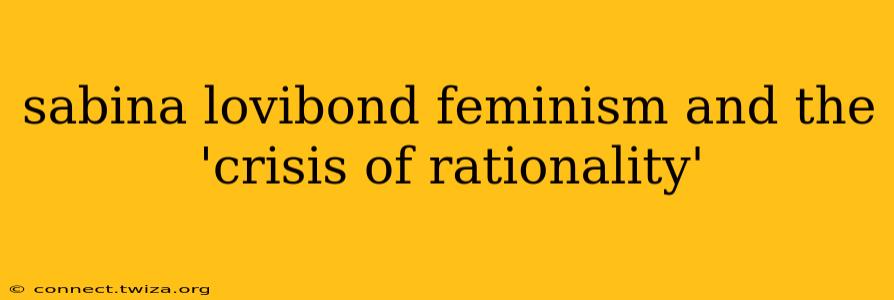Sabina Lovibond, a prominent figure in feminist philosophy, offers a compelling critique of traditional conceptions of rationality, arguing that they are deeply intertwined with patriarchal power structures. Her work doesn't simply identify a "crisis of rationality," but rather exposes how dominant models of rationality have historically marginalized and silenced feminist perspectives. Understanding Lovibond's work requires engaging with her nuanced understanding of reason, emotion, and the political implications of philosophical frameworks.
What is Lovibond's Critique of Rationality?
Lovibond's critique centers on the inherent biases embedded within what she terms "masculinist rationality." This isn't a rejection of reason altogether, but rather a challenge to the specific form rationality has taken throughout history, often excluding or devaluing perspectives deemed "irrational" – perspectives that are frequently associated with women and emotions. She argues that this dominant model of rationality, often rooted in Enlightenment thought, privileges abstract reasoning, objectivity, and detachment, qualities often considered masculine traits. This leaves little room for the kind of embodied knowledge, emotional intelligence, and relational understanding often associated with feminine experiences and perspectives. For Lovibond, true rationality should be inclusive and encompass a broader range of cognitive capacities.
How Does Lovibond Connect Rationality to Patriarchy?
Lovibond meticulously demonstrates the deep connections between dominant forms of rationality and the maintenance of patriarchal power. The exclusion of emotional intelligence and relational understanding from the realm of "rational discourse" serves to legitimize systems that marginalize women. By defining rationality in ways that privilege traditionally masculine attributes, patriarchal structures are reinforced and legitimized. Her analysis isn't simply a critique of philosophical concepts; it's a critique of the social and political structures that those concepts underpin.
What are the Alternatives Lovibond Suggests?
Lovibond doesn't offer a single, easily defined alternative to masculinist rationality. Instead, she advocates for a more inclusive and expansive understanding of reason that recognizes the validity of diverse forms of knowledge and experience. This includes acknowledging the role of emotion, context, and relationality in understanding the world. She draws upon feminist ethics and various philosophical traditions to build her case, urging for a re-evaluation of what constitutes genuine rationality and a dismantling of the systems that privilege certain forms of knowing over others. Her work encourages a critical engagement with existing power structures and a move towards a more inclusive and just society.
What is the Significance of Lovibond's Work?
Sabina Lovibond's work is significant because it challenges the foundations of Western philosophical thought and its impact on social and political structures. Her critique of rationality isn't an academic exercise; it's a vital contribution to feminist theory and practice. It highlights the need for a more inclusive and equitable understanding of reason, one that doesn't privilege certain perspectives while silencing others. By exposing the inherent biases within traditional conceptions of rationality, Lovibond provides a powerful framework for dismantling patriarchal systems and promoting a more just and equitable world.
Does Lovibond completely reject traditional notions of rationality?
No, Lovibond does not completely reject traditional notions of rationality. Her critique is not a rejection of reason itself, but rather a critique of the specific ways in which rationality has been defined and deployed historically, often in ways that exclude or devalue perspectives associated with women and emotions. She argues for a more inclusive and expansive understanding of reason that incorporates diverse forms of knowing.
How does Lovibond's work relate to other feminist thinkers?
Lovibond's work builds upon and engages with the ideas of other prominent feminist thinkers. Her work resonates with those who critique the androcentric biases embedded within various philosophical traditions, drawing connections to the work of thinkers who examine the social construction of gender and the ways in which power operates within knowledge systems. Her analysis contributes to a larger body of feminist scholarship aimed at challenging and transforming dominant epistemologies.
What are some key concepts in Lovibond's philosophy?
Key concepts in Lovibond's philosophy include: masculinist rationality, embodied knowledge, relational understanding, feminist ethics, inclusive rationality, and the critique of power structures. Her work interweaves these concepts to offer a powerful critique of traditional philosophical approaches and proposes a more inclusive and equitable alternative. Understanding these concepts is crucial to grasping the significance of her contributions to feminist thought.
This article provides a comprehensive overview of Sabina Lovibond's significant contribution to feminist philosophy and the ongoing debate surrounding rationality. By addressing common questions and offering a deep dive into her key arguments, it aims to provide a valuable resource for those interested in feminist thought and the critical examination of knowledge systems.
